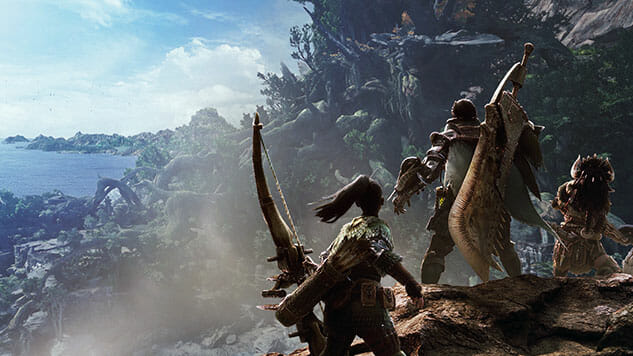In Monster Hunter: World, You (and the Monsters) Are Indestructible

With Monster Hunter: World and Shadow of the Colossus remake released within a few weeks of each other, the two monster-slaying games have faced a lot of comparisons in the way they discuss (or don’t discuss) the repercussions of ending a giant monster’s life. Shadow of the Colossus questions and even punishes Wander’s quest to find and destroy each colossi. Monster Hunter, on the other hand, mostly rewards the player with new weapons, gear, food, and even more monsters to defeat.
In my review for the game, I praised Monster Hunter: World for allowing me a bit of scientific wonder as well as plenty of monster-besting. Ending a long battle successfully certainly feels good, but nothing surpasses my love for exploring the world without any mission at all, free to collect footprints or mucus until I grew tired and returned to the town of Astera to share my findings.
However, the game is more than sleuthing for clues or hunting for herb plants to make potions. It is also about hunting giant, hostile monsters and using their parts for research or other forms of personal gain. For some, killing these beasts for research or science doesn’t justify slaughtering or even capturing a giant beast. Monster Hunter: World lacks the contemplation that Shadow of the Colossus has. Despite its emphasis on research and discovery, the game still boils down to slaying monsters relentlessly until the player is either rewarded with the right parts, or they get bored.
But to expect two monster-slaying games to act similarly to one another falls into the trap of expecting games to do the same thing because they share an objective or genre. There’s a density to Shadow of the Colossus that Monster Hunter does not have. When Wander’s fights with the monsters are long and arduous. When he strikes a colossus to its death, it’s clear that something has changed, both in him and in the environment. Monster Hunter’s quests are long and difficult as well, but in a different sense. They’re timed missions that you pick from a quest board. You can eat and pick out weapons and armor before entering. Even death is inconsequential; players can die three times before the mission is failed.
And no matter how many times we may kill Barroth or Rathalos, they always return. Nothing in Monster Hunter is finite. In Monster Hunter: World, you (and the monsters) are indestructible. Even the human races can be recycled. No one in Astera is named: The Commission, The Admiral, The Hunter, The Handler. No one introduces themselves by their names, but by their fleet number or occupation. The only things that can be identified are the wildlife. This is why the game’s narrative focuses so heavily on the the ever-present cycle of life and death. The players, as the hunters in the community, also play a part in that chain. If there are monsters, there will be monster hunters. This is the series’ circle of life.
This isn’t to say anyone should feel like their hesitation or refusal to partake in monster slaying is invalidated, because the game is as brutal as it is fun. Watching a monster limp away can be sad to watch. Or it can be invalidating to see a monster that you’ve fought for almost an hour finally show a small sign of weakness.
Still, Monster Hunter: World doesn’t want you to worry about them. In fact, they’re creating new life even as hunters strike them down. They are not colossi, and even as you return to your campsite, joyous of the fact that you finally killed a monster, they will be already back at their own nest, waiting for your next attempt.
Shonté Daniels is a poet who occasionally writes about games. Her games writing has appeared in Kill Screen, Motherboard, Waypoint and elsewhere. Her poetry can be seen at Puerto del Sol, Baltimore Review, Phoebe, and others literary journals. Check out Shonte-Daniels.com a full archive, or follow her for sporadic tweeting.








































